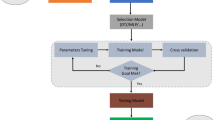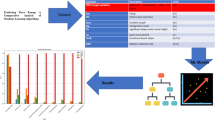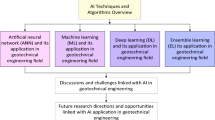Abstract
Measurement of compressional, shear, and Stoneley wave velocities, carried out by dipole sonic imager (DSI) logs, provides invaluable data in geophysical interpretation, geomechanical studies and hydrocarbon reservoir characterization. The presented study proposes an improved methodology for making a quantitative formulation between conventional well logs and sonic wave velocities. First, sonic wave velocities were predicted from conventional well logs using artificial neural network, fuzzy logic, and neuro-fuzzy algorithms. Subsequently, a committee machine with intelligent systems was constructed by virtue of hybrid genetic algorithm-pattern search technique while outputs of artificial neural network, fuzzy logic and neuro-fuzzy models were used as inputs of the committee machine. It is capable of improving the accuracy of final prediction through integrating the outputs of aforementioned intelligent systems. The hybrid genetic algorithm-pattern search tool, embodied in the structure of committee machine, assigns a weight factor to each individual intelligent system, indicating its involvement in overall prediction of DSI parameters. This methodology was implemented in Asmari formation, which is the major carbonate reservoir rock of Iranian oil field. A group of 1,640 data points was used to construct the intelligent model, and a group of 800 data points was employed to assess the reliability of the proposed model. The results showed that the committee machine with intelligent systems performed more effectively compared with individual intelligent systems performing alone.

















Similar content being viewed by others
References
Ameen MS, Smart BGD, Somerville JMC, Hammilton S, Naji NA (2009) Predicting rock mechanical properties of carbonates from Wireline Logs (A case study: Arab-D reservoir, Ghawar field, Saudi Arabia). J Mar Petrol Geol 26:430–444
Baird L, Moore A (1999) Gradient descent for general reinforcement learning. Adv Neural Inf Process Syst 11:968–974
Bakhorji A, Schmitt D (2008) Velocity of P- and S-waves in Arab-D and WCSB (Western Canada Sedimentary Basin, Canada) Carbonates. In: Proceedings 2008 Canadian Society of Petroleum Geology (CSPG), Canadian Society of Exploration Geophysicists (CSEG) and Canadian Well Logging Society (CWLS) Convention, Calgary, Canada, pp 368–372
Balossino P, Pampuri F, Bruni C, Ebzhasarova K (2008) An integrated approach to obtain reliable permeability profiles from logs in a carbonate reservoir. SPE Russian Oil and Gas Conference (Moscow, 3–6 Oct.), SPE 102289
Battiti R (1992) First and second order methods for learning: between steepest descent and Newton’s method. Neural Comput 4(2):141–166
Bishop CM (1995) Neural networks for pattern recognition. Clarendon Press, Oxford, p 670
Brie A, Endo T, Johnson DL, Pampuri F (2000) Quantitative formation permeability evaluation from Stoneley waves. In: SPE annual technical conference and exhibition, (New Orleans, 27–30 September), SPE 60905
Brie A, Hsu K, Eckersley C (1988) Using the Stoneley normalized differential energies for fractured reservoir evaluation. In: SPWLA 29th annual logging symposium (held June 5–8)
Burney SMA, Jilani TA, Ardil C (2004) Levenberg–Marquardt algorithm for Karachi stock exchange share rates forecasting. Trans Eng Comput Technol 3:1305–1313
Castagna JP, Batzle ML, Eastwood RL (1985) Relationship between compressional and shear wave velocities in silicate rocks. Geophysics 50:571–581
Chang C, Zoback MD, Khaksar A (2006) Empirical relations between rock strength and physical properties in sedimentary rocks. J Petrol Sci Eng 51:223–237
Chen CH, Lin ZS (2006) A committee machine with empirical formulas for permeability prediction. Comput Geosci 32:485–496
Chiu S (1994) Fuzzy model identification based on cluster estimation. J Intell Fuzzy Syst 2:267–278
Cranganu C (2007) Using artificial neural networks to predict the presence of overpressured zones in the Anadarko Basin, Oklahoma. Pure Appl Geophys 164:2067–2081
Cuddy SJ (1998) Litho-facies and permeability prediction from electrical logs using fuzzy logic. In: Eighth Abu Dhabi international petroleum exhibition and conference, Abu Dhabi, UAE, Society of Petroleum Engineers (SPE) 65411 (49470), pp 1–12
Demuth H, Beale M (2002) Neural network toolbox, user’s guide (Version 4). The Mathworks Inc
Doan CD, Liong SY, Karunasinghe DSK (2005) Derivation of effective and efficient data set with subtractive clustering method and genetic algorithm. J Hydroinform 7(4):219–233
Eaton BA (1972) Graphical method predicting pressure worldwide. World Oil 185:51–56
Eberli GP, Baechle GT, Anselmetti FS, Incze ML (2003) Factors controlling elastic properties in carbonate sediments and rocks. Leading Edge 22(7):654–660
Endo T (2006) Evaluation of formation permeability from borehole Stoneley waves. J Geogr 115:383–399
Fang JH, Karr CL, Stanley DA (1993) Genetic algorithm and its application to petrophysics. J Soc Petrol Eng, SPE 26208
Gassmann F (1951) Über Die Elastizität poröser median (Elasticity of porous media). Vier der Natur Gesselschaft in Zurich 96:1–23
Golden RM (1996) Mathematical methods for neural network analysis and design. MIT Press, Cambridge
Han DH (1986) Effects of porosity and clay content on acoustic properties of sandstone and unconsolidated sediments. PhD dissertation, Stanford University
Han D (1989) Empirical relationships among seismic velocity, effective pressure, porosity and clay content in sandstone. Geophysics 54:82–89
Haykin S (1991) Neural networks: a comprehensive foundation. Prentice-Hall, Englewood Cliffs, p 842
Holland JH (1975) Adaptation in natural and artificial systems. University of Michigan Press, Ann Arbor, p 183
Jamialahmadi M, Javadpour FG (2000) Relationship of permeability, porosity and depth using an artificial neural network. J Pet Sci Eng 26:235–239
Jarrah OA, Halawani A (2001) Recognition of gestures in arabic sign language using neuro-fuzzy systems. Artif Intell 133:117–138
Jung YB, Sunwoo C (2005) Automatic discontinuity set identification using genetic algorithm based clustering technique. Taylor and Francis Group, London ISBN 04 1538 042 1
Kadkhodaei-Illkchi A, Rezaee MR, Moallemi SR (2006) A fuzzy logic approach for the estimation of permeability and rock types from conventional well log data: an example from Kangan reservoir in Iran offshore gas field. J Geophys Eng 3:356–369
Kadkhodaei-Illkchi A, Rahimpour-Bonab H, Rezaee MR (2008) A committee machine with intelligent systems for estimation of total organic carbon content from petrophysical data: an example from Kangan and Dallan reservoirs in south pars gas field, Iran. J Comput Geosci 35:459–474
Kadkhodaei-Illkchi A, Rezaee MR, Rahimpour-Bonab H, Chehrazi A (2009) Petrophysical data prediction from seismic attributes using committee fuzzy inference systems. J Comput Geosci 35:2314–3330
Kecman V (2001) Learning and Soft Computing. Cambridge, Massachusetts, pp 9–24
Kononen V (2005) Gradient descent for symmetric and asymmetric multiagent reinforcement learning. Web Intell Agent Syst 3:17–30
Kosko B (1993) Fuzzy thinking: the new science of fuzzy logic. In: Hyperion Publishers, New York, p 318
Kumar J (1976) The effect of Poisson’s Ratio on rock properties. In: 51st annual fall technical conference and exhibition of the Society of Petroleum Engineers of AIME (New Orleans, Oct. 3–6), SPE 6094
MacKay DJC (1992) A practical Bayesian framework for backpropagation networks. Neural Comput 4:448–472
Mamdani EH, Assilian S (1975) An experimental in linguistic synthesis with a fuzzy logic control. Int J Man Machine Stud 7:1–13
MATLAB user’s guide (2007) Fuzzy logic, neural network & GA and direct search toolboxes, MATLAB CD-ROM, by the Mathworks, Inc
Mohaghegh SD, Goddard C, Popa A, Ameri S, Bhuiyan M (2000a) Reservoir characterization through synthetic logs. In: SPE Eastern Regional Meeting (Morgantown, West Virginia, 17–19 October), SPE 65675
Mohaghegh S (2000a) Virtual-intelligence applications in petroleum engineering: Part 3—fuzzy logic. J Petrol Technol 52:82–87
Mohaghegh S (2000b) Virtual-intelligence applications in petroleum engineering: Part 2—evolutionary computing. J Petrol Technol 52:40–46
Nikravesh M, Zadeh LA, Aminzadeh F (eds) (2003) Soft computing and intelligent data analysis in oil exploration. Elsevier, Berkeley
Pickett GR (1963) Acoustic character logs and their applications in formation evaluation. J Petrol Technol 15:650–667
Prieto MJ, Barbato R, Sinha A, Gomez G (1997) Conciliation of core data and log derived permeability from nuclear magnetic resonance and Stoneley Wave in Northern Monagas Area, Eastern Venezuela. In: SPWLA 38th annual logging symposium (held June 15–18)
Qobi L, de Kuijper A, Tang XM (2001) Permeability determination from Stoneley Waves in the Ara Group Carbonates, Oman. GeoArabia 6(4):649–666
Rajabi M, Bohloli B, Ahangar E (2009) Intelligent approach for prediction of compressional, shear and Stoneley wave velocities from conventional well log data: a case study from the Sarvak Carbonate Reservoir in the Abadan Plain (Southern Iran). J Comput Geosci 36:647–664
Raymer LL, Hunt ER, Gardener JS (1980) an improved sonic transient time-to-porosity transforms. Trans Soc Prof Well log Analyst, 21st annual logging symposium, Paper P
Reformat M (1997) Application of genetic algorithms in control design for advanced static VAR Compensator at ac/dc interconnection. University of Manitoba Press, Canada, p 129
Rezaee MR, Kadkhodaie-Ilkhchi A, Alizadeh PM (2008) Intelligent approaches for the synthesis of petrophysical logs. J Geophys Eng 5:12–26
Rezaee MR, Kadkhodaie-Ilkhchi A, Barabadi A (2007) Prediction of shear wave velocity from petrophysical data utilizing intelligent systems: an example from a sandstone reservoir of Canarvon Basin, Australia. J Petrol Sci Eng 55:201–212
Riedmiller M, Braun H (1993) A direct adaptive method for faster back-propagation learning: The RPROP Algorithm. Proc IEEE Conf Neural Netw
Ross T (1995) Fuzzy logic with engineering applications. McGraw-Hill, New York, pp 94–96
Saggaf MM, Nebrija L (2003) (eds) A fuzzy approach for the estimation of facies from wireline logs. AAPG Bulletin 87:1223–1240
Sharkey AJC (1996) On combining artificial neural networks. Connect Sci 8:299–314
Takagi T, Sugeno M (1985) Identification of systems and its application to modeling and control. IEEE Trans Syst Man Cybern 15:116–132
Tang XM, Patterson D (2001) Detecting thin gas beds in formations using Stoneley wave reflection and high-resolution slowness measurements. In: SPWLA 42th annual logging symposium (held June 17–20)
Tang XM, Patterson D (2004) Estimating formation permeability and anisotropy from Borehole Stoneley waves. In: SPWLA 45th annual logging symposium (Noordwijk, Netherlands, 6–9 June)
Tosaya C, Nur A (1982) Effects of diagenesis and clays on compressional velocities in rocks. Geophys Res Lett 9:5–8
Wang Z (2001) Fundamentals of seismic rock physics. Geophysics 66:398–412
Wendt AS, Kongslien M, Sinha BK, Vissapragada B, Newton A, Skomedal E, Renlie L, Pedersen ES (2007) Enhanced mechanical earth modeling and wellbore stability calculations using advanced sonic measurements—a case study of the HP/HT Kvitebjorn Field in the Norwegian North Sea. In: SPE annual technical conference and exhibition (Anaheim, California, 11–14 November), SPE 109662
Williams DM, Zemanek J, Angona FA, Dennis CL, Caldwell RL (1984) The long spaced acoustic logging tool. In: Proceedings 25th transactions society of petrophysicists and well log analysts (SPWLA) annual logging symposium, New Orleans, Paper T, p 16
Wyllie MRJ, Gardener GHF, Gregory AR (1963) Studies of elastic wave attenuation in porous media. Geophysics 27:569–589
Wyllie MRJ, Gregory AR, Gardener LW (1956) Elastic wave velocities in heterogeneous and porous media. Geophysics 21:41–70
Wyllie MRJ, Gregory AR, Gardener GHF (1958) An experimental investigation of factors affecting elastic wave velocities in porous media. Geophysics 23:459–493
Zadeh LA (1965) Fuzzy sets. Inf Control 8:338–353
Author information
Authors and Affiliations
Corresponding author
Rights and permissions
About this article
Cite this article
Asoodeh, M., Bagheripour, P. Prediction of Compressional, Shear, and Stoneley Wave Velocities from Conventional Well Log Data Using a Committee Machine with Intelligent Systems. Rock Mech Rock Eng 45, 45–63 (2012). https://doi.org/10.1007/s00603-011-0181-2
Received:
Accepted:
Published:
Issue Date:
DOI: https://doi.org/10.1007/s00603-011-0181-2




